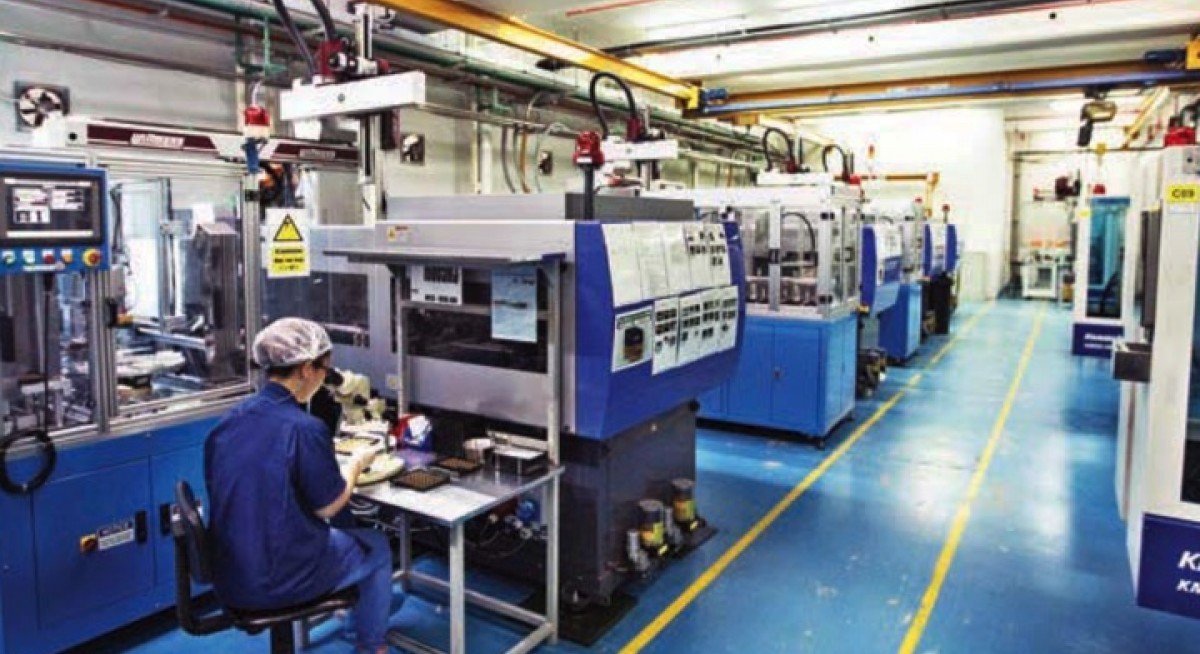The PMI for the electronics sector, a key subset of Singapore’s overall manufacturing output, contracted for its eighth consecutive month, falling 0.2 point to 49.2. The sector saw contractions in new orders, new exports, factory output, inventory level and employment level as well. UOB economist Barnabas Gan sees these figures as reinforcing the view that Singapore’s economic prospects have worsened.
“With PMI now printing in contraction zone, it does give a precursor to a sustained contraction in the manufacturing environment into the second quarter of the year,” writes Gan in a July 4 note.
Singapore is currently being buffeted by the US-China trade tensions, as well as a general slowdown in the global tech cycle, says Gan. “Recent Singapore-centric data including exports and manufacturing has been in the doldrums as well, as seen from non-oil domestic exports contracting 15.9% in May, the deepest decline since March 2016. Given that Singapore’s manufacturing environment hums along in tandem with export demand, the insipid export momentum does explain the ongoing manufacturing decline at this juncture,” he adds.
As the US and China have agreed to resume talks, Trump has put off his earlier threat to impose tariffs on another US$300 billion ($407 billion) worth of US imports from China. However, analysts such as Samuel Siew of Phillip Futures are reminding investors not to get too optimistic. “It is to be noted that postponing does not equate to cancellation, and there is still a possibility of it resurfacing should trade talks fall through once again,” he writes in July 4 note.
Oil and gold rebounds
Oil and gold prices have rebounded just before the US’ July 4 holiday. The American Petroleum Institute reported that inventory levels dropped again, while the US Energy Information Administration’s weekly report shows crude stock shrinking 1.1 million barrels and gasoline 1.6 million barrels. West Texas Intermediate, for example, gained 2.06% and Brent gained 2.53% on July 3. However, Alfonso Esparza, senior market analyst at -Oanda, warns that a sustainable recovery is not likely. “The meeting at the G20 between Presidents Donald Trump and Xi Jinping was not a success, and with declining economic indicators and more trade battles gearing up, energy demand is under pressure,” he writes in a July 4 note.
Similarly, gold rose 0.89% on July 3, trading above US$1,400 as G20 trade optimism fades. Weak global manufacturing and US officials’ comments on the length and difficulty of a US-China deal are making gold an attractive play, according to Esparza.
“The G20 did not yield a concrete trade deal between the US and China and with Trump rushing to another trade dispute, this time against the European Union, gold is once again the preferred safe haven,” notes Esparza.
“Next up for the gold rally is the US employment report on [July 5]. Nothing short of an incredible number of jobs and wages over the forecast will be enough to dampen the [US Federal Reserve’s] interest rate cut narrative that is keeping the yellow metal on the rise,” he adds.
SunMoon and DISA piques interest
SunMoon Food Co, a much beaten down and thinly traded stock, roared into life on July 3. The stock more than doubled to four cents for the day and added a further 1.5 cents to close at 5.5 cents on July 4. The company, in response to a query from the Singapore Exchange on its un-usual trading pattern, says that it was not aware of any other reason for the jump other than a July 2 DBS report.
In the report, DBS included SunMoon Food, which sources and distributes fruits and vegetables, in a shortlist of consumer stocks to watch. What makes SunMoon Food interesting is that its controlling shareholder Shanghai Yiguo E-commerce is backed by China’s e-commerce giant Alibaba Group Holding. Yiguo’s business of sourcing for fruits, foodstuff and other consumer edibles is a platform for SunMoon to leverage and grow. After -Yiguo became SunMoon’s controlling shareholder in FY2017, the latter’s revenue has surged from $20 million to $73 million in FY2019 ended March 31, 2019.
However, costs still remain high as critical mass has not yet been reached. The report postulates that streamlining SunMoon’s operations with Yiguo’s makes sense as it removes duplication of resources and reduces costs. “In our view, it could make economic sense for Yiguo (Alibaba), as a platform owner, to gain dominant control of SunMoon, which has strong branding and a wide global distribution network, while SunMoon could potentially turn around from its current loss-making position,” states DBS.
DISA, which makes anti-theft systems for retailers, saw active trading this past week too. On July 2, the company announced a y-o-y increase of its codes sold from its point-of-sale activation and single scan serialisation products. In 4Q2019 ending June 30, the company sold 1.3 million codes, an increase of 62.5% y-o-y. DISA has recorded y-o-y increases of code sales across all quarters in FY2019, and recorded a 160.5% rise y-o-y for code sales in FY2019. Shares in DISA jumped 50% to three cents on July 3, before dipping to one cent and closing back at two cents on July 4.
The week ahead
This coming week, SPH REIT will report its 3Q earnings on July 11. Its parent company, Singapore Press Holdings, will follow suit on July 12. On the same day, Singapore will report its advanced estimates for second quarter GDP and also retail sales data for May. On July 10, the US will report wholesalers’ inventories numbers for May, and the consumer price index on July 11.



